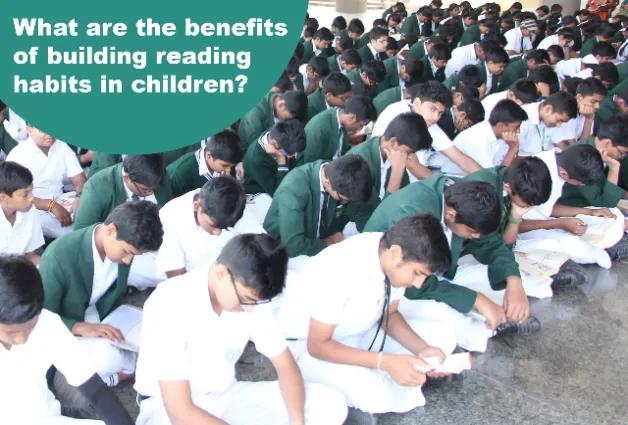Reading can be a fun and enjoyable activity for children. It can be a great way for them to relax and unwind after a busy day, or to bond with friends who share similar reading habits and topics. Children who enjoy reading in their teenage years are more likely to continue reading into adulthood, which can have a positive impact on their overall well-being throughout their lives. Building a reading habit in children not only improves their reading skills but also has a wide range of other benefits that can positively impact their overall well-being.
Some of the benefits of reading:
1. Improved Reading Comprehension –
One of the most obvious benefits of reading is that it improves reading comprehension skills. Children who read regularly are able to better understand the written content and express themselves more effectively through writing. They also tend to have a larger vocabulary and better grammar skills, which can make a big difference in their academic performance.
2. Increased Vocabulary –
Reading helps expand a child’s vocabulary which includes written and spoken words both. When children read, they encounter new words and phrases that they may not have encountered before. This exposure to new words and phrases promotes an enhanced vocabulary. By encouraging them to use new-found words, we can spur a sense of curiosity and love for language and self-expression too.
3. Improved Concentration –
At a time when attention spans are ever-decreasing, reading requires focus and concentration. By building a reading habit they improve their ability to concentrate. The more a child reads, the more he/she is exposed to different types of texts, and writing styles, and learns to focus on the task at hand. This improved concentration can be beneficial in other areas of their lives, such as in school and in other activities like sports, dance, and music.
4. Improved creativity and imagination –
Reading can also help to increase a child’s creativity and imagination. When children read, they are exposed to new ideas and perspectives, which can inspire them to think creatively and come up with new ideas of their own. Improved creativity is a key attribute for success in different areas of their lives, including in school, in their hobbies, and in their future careers.
5. Increased Self-Esteem –
Reading can provide children with a sense of accomplishment and pride as they learn to read and comprehend complex chunks of text. When children read, they are exposed to new and challenging writing, which develops their reading skills and makes them feel more confident in their abilities. This increased self-esteem makes kids more resilient and better able to cope with criticisms, challenges, and setbacks.
6. Improved Mental Health –
Reading can also improve a child’s mental health. Reading can often become a form of escapism, and it can provide children [and also adults] with a way to relax and get lost in a world of story and make-believe. This can be beneficial for children who are coping with stress or anxiety, as it can take their minds off of their circumstances, or even learn how to cope with them through the books they read. Just the act of focusing on something positive, creative, and exciting is equally rewarding as an activity.
Reading affects cognitive brain development in kids as has been proven by a lot of medical research. By engaging with the written word, children are able to exercise their brains resulting in improved memory, concentration, and sharper critical thinking skills. This stimulates the brain, which can have a protective effect against age-related cognitive decline.
7. Foster empathy –
Often a lot of stories, and characters are able to evoke an improved sense of empathy among the kids, or readers, even. When children read about characters, first-person accounts, and their experiences, they are able to put themselves in the characters’ shoes and gain a greater understanding of the world around them. This can develop a sense of compassion and empathy towards others, which will lead to better relationships with peers and adults.
8. Enhances general knowledge –
Reading is an excellent way to improve a child’s general knowledge and understanding of the world around them. Children who read regularly are exposed to a wide variety of information and ideas, which helps them develop a more informed, nuanced, and curious perspective on life. While kids naturally are curious by nature, reading allows them to answer the many questions they have, all the while helping them develop a sense of seeking answers to questions through this curiosity.
Getting children into reading has lots of good things. It helps with words, focus, creativity, feeling good about themselves, and understanding others. Reading also makes their brains stronger and helps them handle feelings better. When kids read, they not only gain knowledge but also develop crucial life skills. So, cheering them on to enjoy reading is like giving them a great start for a happy and interesting future, ensuring a continuous journey of growth and self-discovery.




